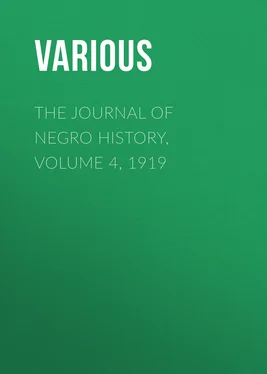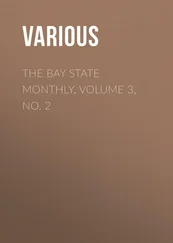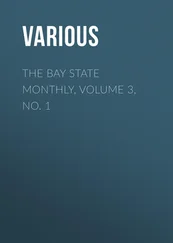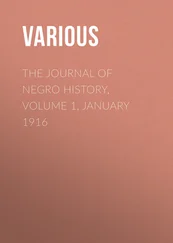Various - The Journal of Negro History, Volume 4, 1919
Здесь есть возможность читать онлайн «Various - The Journal of Negro History, Volume 4, 1919» — ознакомительный отрывок электронной книги совершенно бесплатно, а после прочтения отрывка купить полную версию. В некоторых случаях можно слушать аудио, скачать через торрент в формате fb2 и присутствует краткое содержание. Жанр: foreign_antique, periodic, История, foreign_edu, на английском языке. Описание произведения, (предисловие) а так же отзывы посетителей доступны на портале библиотеки ЛибКат.
- Название:The Journal of Negro History, Volume 4, 1919
- Автор:
- Жанр:
- Год:неизвестен
- ISBN:нет данных
- Рейтинг книги:5 / 5. Голосов: 1
-
Избранное:Добавить в избранное
- Отзывы:
-
Ваша оценка:
- 100
- 1
- 2
- 3
- 4
- 5
The Journal of Negro History, Volume 4, 1919: краткое содержание, описание и аннотация
Предлагаем к чтению аннотацию, описание, краткое содержание или предисловие (зависит от того, что написал сам автор книги «The Journal of Negro History, Volume 4, 1919»). Если вы не нашли необходимую информацию о книге — напишите в комментариях, мы постараемся отыскать её.
The Journal of Negro History, Volume 4, 1919 — читать онлайн ознакомительный отрывок
Ниже представлен текст книги, разбитый по страницам. Система сохранения места последней прочитанной страницы, позволяет с удобством читать онлайн бесплатно книгу «The Journal of Negro History, Volume 4, 1919», без необходимости каждый раз заново искать на чём Вы остановились. Поставьте закладку, и сможете в любой момент перейти на страницу, на которой закончили чтение.
Интервал:
Закладка:
And Be it Therefore Resolved , That in case said committee shall find that said migration of colored people from the South has been caused by cruel and unjust treatment or by the denial or abridgement of personal or political rights, have so far inquired and reported to the Senate, first; what, if any, action of Congress may be necessary to secure to every citizen of the United States the full and free enjoyment of all rights guaranteed by the constitution; second; where the peaceful adjustment of the colored race of all sectional issues may not be best secured by the distribution of the colored race through their partial migration from those States and congressional districts where, by reason of their numerical majority, they are not allowed to freely and peacefully exercise the rights of citizenship; and third; that said committee shall inquire and report as to the expediency and practicability of providing such territory or territories as may be necessary for the use and occupation of persons who may desire to migrate from their present homes in order to secure the free, full, and peaceful enjoyment of their constitutional rights and privileges. 72 72 Congressional Record, 46th Congress, 2d Session, X, p. 170.
The Select Committee, appointed by the Senate to investigate the causes which have led to the migration of the Negroes from the Southern States to the Northern States, having duly considered the same, beg leave to submit the following report : 73 73 Reports of Committees of Senate of the United States for the First and Second Sessions of the Forty-Sixth Congress, 1879-80, VII, pp. iii-xiii.
On the 18th day of December, 1879, the Senate passed the following resolution:
Whereas, large numbers of Negroes from the Southern States are emigrating to the Northern States; and,
Whereas, it is currently alleged that they are induced to do so by the unjust and cruel conduct of their white fellow-citizens towards them in the South, and by the denial or abridgement of their personal and political rights and privileges; therefore,
Be it Resolved , That a committee of five members of this body be appointed by its presiding officer, whose duty it shall be to investigate the causes which have led to the aforesaid emigration, and to report the same to the Senate; and said committee shall have power to send for persons and papers, and to sit at any time.
In obedience to this resolution the committee proceeded to take testimony on the 19th day of January, and continuing from time to time until 153 witnesses had been examined, embracing persons from the States of North Carolina, Georgia, Alabama, Mississippi, Louisiana, Texas, Missouri, Kansas, and Indiana. Much of this testimony is of such a character as would not be received in a court of justice, being hearsay, the opinions of witnesses, &c., but we received it with a view to ascertaining, if possible, the real state of facts in regard to the condition of the Southern colored people, their opinions and feelings, and the feelings and opinions of their white neighbors. We think it clearly established from the testimony that the following may be said to be the causes which have induced this migration of the colored people from various portions of the South to Northern States, chiefly to Kansas, and Indiana: That from North Carolina, the State to which we first directed our attention, was undoubtedly induced in a great degree by Northern politicians, and by Negro leaders in their employ, and in the employ of railroad lines.
Examining particularly into the condition of the colored men in that State, it was disclosed by the testimony of whites and blacks, Republicans and Democrats, that the causes of discontent among those people could not have arisen from any deprivation of their political rights or any hardship in their condition. A minute examination into their situation shows that the average rate of wages, according to the age and strength of the hand for field labor, was from eight to fifteen dollars per month, including board and house to live in, garden and truck patches, around the house, fire-wood, and certain other privileges, all rent free.
These, added to the extra labor which could be earned by hands during the season of gathering turpentine and resin, or of picking cotton made the general average of compensation for labor in that State quite equal to if not better than in any Northern State to which these people were going, to say nothing of the climate of North Carolina, which was infinitely better adapted to them.
The closest scrutiny could detect no outrage or violence inflicted upon their political rights in North Carolina for many years past. They all testified that they voted freely; that their votes were counted fairly; that no improper influence whatsoever was exerted over them; and many were acquiring real estate, and were enjoying the same privileges of education for their children, precisely, that the whites were enjoying.
It was also disclosed by the testimony that there existed aid societies in the city of Washington, in the city of Topeka, Kans., Indianapolis, and elsewhere throughout the West, whose avowed object was to furnish aid to colored men migrating to the West and North; and notwithstanding that the agents and members of these societies generally disclaimed that it was their intention to induce any colored men to leave their homes, but only to aid in taking care of them after they had arrived, yet it was established undeniably, not only that the effect of these societies and of the aid extended by them operated to cause the exodus originally, but that they stimulated it directly by publishing and distributing among the colored men circulars artfully designed and calculated to stir up discontent. Every single member, agent, friend, or sympathizer with these societies and their purposes were ascertained to belong to the Republican party, and generally to be active members thereof. Some of the circulars contained the grossest misrepresentation of facts, and in almost all cases the immigrants expected large aid from the government of clothes, or land, or money or free transportation, or something of that kind. Hundreds of them, on given days at various points in the South, crowded to the depots or to the steamboat landings upon a rumor that free transportation was to be furnished to all who would go. It was also disclosed by the testimony on the part of some very candid and intelligent witnesses that their object in promoting this exodus of the colored people was purely political. They thought it would be well to remove a sufficient number of blacks from the South, where their votes could not be made to tell, into close States in the North, and thus turn the scale in favor of the Republican party.
Wages, rents, method of cropping on shares, &c., were inquired into in all of the Southern States mentioned, and the fact ascertained that the aggregate was about the same as in North Carolina. In most of the Southern States, where wages were higher than in North Carolina, expenses were also higher, so that the aggregate, as before stated, was about the same.
One cause of complaint alleged as a reason for this exodus of the colored people from the South was their mistreatment in the courts of justice. Directing our attention to this the committee have ascertained that in many of the districts of the South the courts were under entire Republican control—judges, prosecuting attorneys, sheriffs, &c., and that there were generally as many complaints from districts thus controlled as there were from districts which were under the control of the Democratic officials; and that the whole of the complaints taken together might be said to be such as are generally made by the ignorant who fail to receive in courts what they think is justice.
Читать дальшеИнтервал:
Закладка:
Похожие книги на «The Journal of Negro History, Volume 4, 1919»
Представляем Вашему вниманию похожие книги на «The Journal of Negro History, Volume 4, 1919» списком для выбора. Мы отобрали схожую по названию и смыслу литературу в надежде предоставить читателям больше вариантов отыскать новые, интересные, ещё непрочитанные произведения.
Обсуждение, отзывы о книге «The Journal of Negro History, Volume 4, 1919» и просто собственные мнения читателей. Оставьте ваши комментарии, напишите, что Вы думаете о произведении, его смысле или главных героях. Укажите что конкретно понравилось, а что нет, и почему Вы так считаете.












